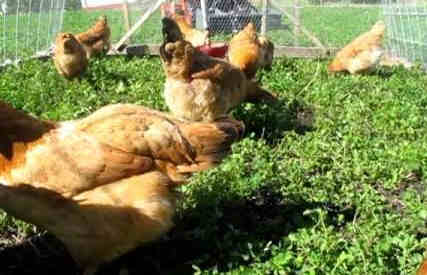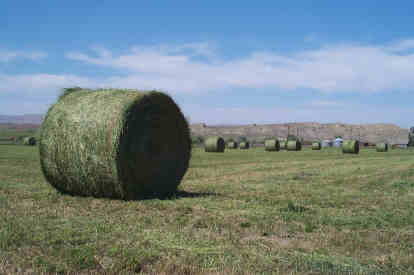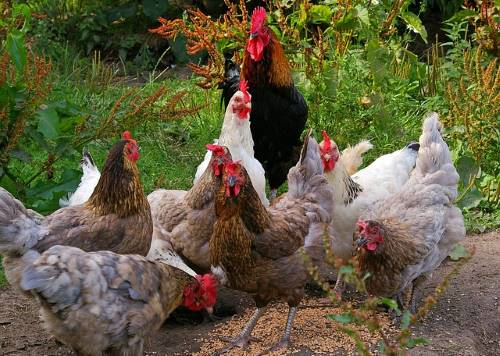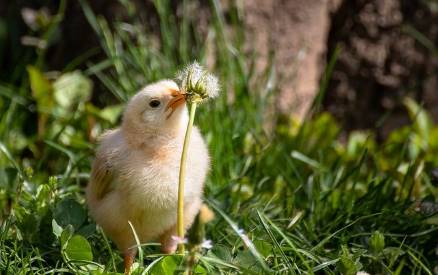Chickens are omnivores, which means that they will eat just about anything. This includes bugs, leaves, and even snakes. However, that doesn’t mean that everything they eat is good for them. So, can chickens eat alfalfa?
Yes, alfalfa is an excellent source of nutrition for chickens. This perennial flowering plant is packed with vitamins, minerals, and fiber. It’s also a great source of protein, making it an ideal food for chickens.
This blog post will discuss the benefits of feeding alfalfa to chickens. We’ll also provide tips on incorporating this healthy plant into your chicken’s diet.

What is alfalfa?
Alfalfa is a type of forage plant that is typically used as feed for livestock. It is a pea family member and native to Eurasia and North Africa. Alfalfa has a deep root system that helps to hold the soil in place, preventing erosion.
The plant is also known for its high nutritional value, rich in protein, vitamins, and minerals. In addition, alfalfa provides a good source of roughage, which is essential for proper digestion.
For these reasons, alfalfa is an important crop for livestock farmers and those who produce hay for animal feed.
[ChickenAffiliate]
Can chickens eat alfalfa?
You might be surprised to learn that chickens can eat alfalfa. Alfalfa is a type of forage crop, and it is high in protein and fiber. It also contains various vitamins and minerals, making it an excellent choice for chicken feed.
However, there are a few things to keep in mind when feeding alfalfa to chickens. First, alfalfa should not make up more than 10% of their diet. Second, it is best to offer alfalfa in hay or pellet form instead of fresh leaves.
And finally, be sure to provide plenty of water, as alfalfa can be dehydrating. With these guidelines in mind, you can feel confident that your chickens get all the nourishment they need from their diet.
The benefits of eating alfalfa for chickens

Chickens are omnivores, which means that they enjoy eating a variety of different foods. One type of food that chickens love is alfalfa. Alfalfa is a nutrient-rich plant that can offer many benefits to chickens.
Some of the benefits of feeding alfalfa to chickens include:
Lots of nutrients
Alfalfa is packed with nutrients. It is a good source of vitamins A, C, and K and minerals like calcium and iron. These nutrients can help to keep chickens healthy and promote strong bones and feathers.
High in protein
Alfalfa is also high in protein, essential for chicken growth and development. Alfalfa contains more protein than many other types of chicken feed.
This makes alfalfa an ideal food for growing chicks and juvenile chickens. It can also be beneficial for laying hens, as protein is essential for egg production.
Fiber for digestion
Alfalfa is a good source of fiber, which is important for chicken digestion. Fiber helps to keep the digestive tract moving and can prevent issues like constipation and diarrhea.
A diet including alfalfa can help keep your chickens healthy and free from digestive problems.
Things to watch out for when feeding alfalfa to chickens
While alfalfa can be a healthy and nutritious part of your chicken’s diet, there are a few things to watch out for.
Moderation
Alfalfa should not make up more than 10% of their diet. This is because alfalfa is high in protein and calcium, which can cause problems if chickens eat too much.
Too much protein can lead to liver and kidney problems, while too much calcium can cause bladder stones. For these reasons, it is important to offer alfalfa in moderation.
Provide plenty of water
Alfalfa can dehydrate, so it is important to provide plenty of water when feeding this plant to chickens. Chickens should have access to fresh, clean water at all times.
If you are feeding alfalfa in the form of hay or pellets, be sure to soak them in water for a few minutes before offering them to your chickens. This will help to rehydrate the alfalfa and make it easier for your chickens to eat.
How often should chickens eat alfalfa?

Chickens can eat alfalfa daily. Alfalfa is high in protein and calcium, essential for chickens’ growth and development. Furthermore, alfalfa helps to promote a healthy digestive system and can even help to reduce stress levels.
While there is no hard and fast rule about how much alfalfa chickens should eat, a general rule of thumb is to provide them with about 1/4 cup of alfalfa per day. Of course, this may need to be adjusted based on the individual chicken’s needs.
If you are unsure how much alfalfa your chicken should be eating, it is best to consult with a veterinarian or poultry expert.
How to prepare alfalfa for feeding to chickens
Alfalfa must be prepared properly before feeding it to your feathered friends. The first step is to chop the alfalfa into small pieces. This will make it easier for the chickens to eat and help them digest the food more easily.
Next, soak the alfalfa in water for at least an hour. Soaking will soften the tough fibers and make them more palatable for the chickens. Finally, add the soaked alfalfa to your chicken’s regular feed or offer it as a treat.
By following these simple steps, you can ensure that your chickens get all the nutrients they need to stay healthy and happy.
Can baby chicks eat alfalfa?

Baby chicks can eat alfalfa, but it should only be offered in small amounts. Alfalfa is high in protein and calcium, which can help chicks to grow strong bones and muscles.
However, too much alfalfa can cause digestive problems and lead to poor absorption of other nutrients. If you offer alfalfa to your chicks, do so in moderation and supplement with other healthy foods such as fresh vegetables and fruits.
What Other Plants Can Chickens Eat Apart From Alfalfa?
Alfalfa is well recognized as a beneficial plant for chickens, providing them with essential vitamins and minerals. However, it is not the only plant that can contribute positively to their diet. A varied diet is crucial for chickens to ensure they receive a broad spectrum of nutrients. Here are five additional plants that can be considered for chicken feed and why they are suitable.
Grass
Grass is a common and plentiful source of nutrients for chickens. It’s a great source of natural carbohydrates and fiber, and it also contains protein, vitamins, and minerals. Chickens will happily peck at fresh grass, particularly in spring when new shoots are tender and juicy. Grass clippings from mowed lawns can also be used, provided they are free from pesticides or other chemicals. The green pigment in grass, chlorophyll, is also excellent for enhancing the color of egg yolks.
Read More: Do Chickens Eat Grass? Uncovering The Truth About Their Diet
Clover
Chickens love clover, and it’s a fantastic plant to include in their diet. Like alfalfa, clover is a legume, meaning it is rich in protein and fiber. Additionally, clover contains essential nutrients such as calcium, phosphorus, and vitamin A. It is also a natural source of isoflavones, compounds that may help in maintaining the health of your flock. Remember to ensure the clover is free of any chemical treatments before providing it to chickens.
Read More: Can Chickens Eat Clover? 6 Fantastic Benefits
Hay
Hay can be a useful plant food for chickens, especially during the colder months when other green vegetation might be scarce. It’s made from dried grass, so it carries many of the same nutrients, although the nutrient content can decrease with storage time. Chickens will typically scratch and peck at hay, consuming the seeds and leaves. Hay can also provide a source of entertainment and exercise for the chickens as they scratch through it.
Read More: Can Chickens Eat Hay? The Surprising Truth Revealed
Wheat
Wheat is a cereal grain that can be a valuable part of a chicken’s diet. It is high in carbohydrates, providing energy for the birds. It also contains a reasonable amount of protein and a small amount of fat. Whole wheat grains are often included in commercial chicken feeds, but they can also be fed separately as part of a scratch grain mixture. It’s important to remember that wheat should not make up the entire diet of chickens, but rather be part of a balanced diet including other plant sources, grains, and proteins.
Read More: Can Chickens Eat Wheat? Expert Guide To Feeding Your Flock
Barley
Barley is another grain that is good for chickens to eat. It is high in carbohydrates, and it also provides some protein. Barley can be fed to chickens in different forms – whole, cracked, or rolled. It can also be sprouted, a process that increases the nutrient content and makes it easier for chickens to digest. However, similar to wheat, barley should only form part of a balanced diet for chickens.
Read More: Can Chickens Eat Barley? Uncovering The Truth For Your Flock
How to give chickens a healthy and balanced diet
A healthy and balanced diet is essential for chickens. They need a variety of nutrients to stay healthy and produce eggs. A good diet for chickens should include plenty of fresh, green vegetables and some fruits and grains.
Chicken feed typically contains all the necessary nutrients, but you can also supplement their diet with kitchen scraps or specially formulated chicken supplements. It’s important to ensure that your chickens have access to clean water at all times.
You should also monitor their food intake and ensure they are not overeating or eating moldy food. Following these simple guidelines ensures that your chickens will enjoy a healthy and balanced diet.
Can chickens eat alfalfa – final thoughts
Overall, giving your chickens small amounts of alfalfa is generally safe and can be beneficial. Just be sure to research and monitor your chicken’s health to ensure they get the right balance of nutrients.
Related Articles:
